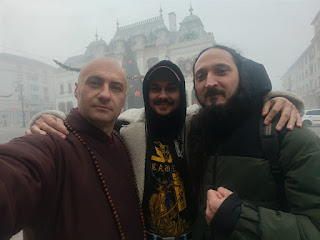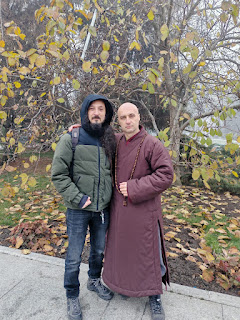A few days earlier, I had been in the city of
Turin, in the Piedmont region of Italy, with my wife on a sightseeing trip. As
usual, I felt the deep discomfort that almost always accompanies me when I step
outside my comfort zone. Among various monuments and museums, we visited the
Museum of Oriental Art (MAO Torino), where I knew several Buddhist objects,
statues, and paintings from Asia were displayed. I have always been attracted,
since childhood, to Eastern aesthetics, particularly Sino-Japanese, which even
influenced my first steps into the Dharma when, in 2008, I set foot in my first
Zen temple.
Since then, many years have passed, during which I practiced zazen and vipassana, attended retreats (sometimes fleeing from them), and visited various Dharma centers in Italy belonging to different schools. I formally took Refuge in the Three Jewels, undertook the Five Precepts, and maintained a general practice—not without struggles—while simultaneously trying to manage various personal, family, and emotional issues.
Returning to that visit to the museum in Turin, I came across a beautiful statue of a standing Amida Nyorai. I felt a mix of attraction and deep emotion, unable to resist the magnificence, majesty, and profound sense of peace and ecstasy the image seemed to convey. I spent several minutes in that room, restraining myself from expressing outwardly what I felt. I decided that once I returned home, I would delve deeper into the Pure Land teachings.
That is how I discovered Rev. Jōshō Adrian Cîrlea’s YouTube channel, struck by his way of presenting Shakyamuni Buddha’s
teachings—so new to me. In the following months, I explored other sources but
found myself increasingly drawn to the videos, articles, and introductory book,
Amida Dharma,
from Amidaji International Temple. At the same time, I began incorporating the
Nembutsu into my daily life.
In 2024, during my band’s European tour, where I found myself light-years outside my comfort zone, performing twelve shows in twelve days across eight countries, a series of causes and conditions led me to write to Jōshō Sensei.
During one of our exchanges, Sensei told me that I'm welcome at Amida-ji, and I thought, “Why not?” After all, if I could survive the extreme experience of touring, I could certainly travel to Romania to meet this teacher. So, a few weeks later, I found myself flying to Craiova.
The next morning, I reached them by bus (seeing Jōshō Sensei in person felt like meeting a celebrity for the first time, after seeing him on YouTube only for almost two years). After a brief tour of the city, Ellis kindly drove us to Amida-ji.
My experience at Amidaji International Temple
was profoundly positive.
Over the three days, I had the chance to ask
many questions about Amida Buddha, the Primal Vow, Faith (Shinjin), and clarify
many doubts clouding my mind. Every moment spent together was a precious
opportunity to learn on multiple levels, not only through words.
Recently, a Dharma teacher, to whom I described my largely home-based approach
to studying and listening to the teachings, emphasized the great importance of
finding an in-person teacher—“someone to learn from.” I like to think that now
I understand what he meant and am glad I followed that advice.
At the Amidado (Amida Hall), I also received
training in chanting the Nembutsu liturgy in Amida-ji’s style, as well as other
chants such as Shoshinge
(The Hymn of True Faith by Shinran Shonin) and Amidakyo (The Smaller Sutra on Amitayus, delivered
by Shakyamuni). Once again, the in-person experience with a teacher proved to
be incredibly richer, deeper, and more powerful than simply using recordings at
home (although very useful anyway).
I gladly accepted Sensei’s invitation to lead (or at least try to) the ceremony, though my voice didn’t project loudly enough. Knowing I’m accustomed to growling and screaming in black metal performances, Sensei encouraged me to use what we dubbed the “Voice” during the recitations. This flipped, one more time, all the clichés about Dharma followers needing to be necessarily calm, serene, and composed all the time.
In the Amidado, there were two honest men acknowledging their spiritual incapacity, entrusting the attainment of Buddhahood to the Immeasurable Vow of the Tathāgata of Infinite Light and Life, saying His Name aloud.
Before returning home, I formally requested to take Refuge in the Three Jewels:
• Buddha (Amida
and automatically all Buddhas),
• Dharma (Amida’s Primal Vow), and
• Sangha (in its aspect of Shinjin).
Rev. Jōshō also gifted me several books that will allow me to continue to“listen deeply” to the Dharma and two beautiful scrolls: one depicting Amida alone, and the other with Amida flanked by Bodhisattvas Mahasthamaprapta on His left and Avalokitesvara on His right.
I am deeply grateful for the opportunity to
have had such an important experience. I am thankful to Rev. Jōshō Adrian
Cîrlea for welcoming me into the broad sleeves of his robes, to the Amidaji
Sangha for their precious support, and, above all, to Amida Buddha for His
Radiant and Unwavering Salvation, reaching all beings in the ten directions
without obstacles—even a bombū
lost above the skies of Romania and the ocean of samsara from a beginningless
past.
Namo Amida Bu.
Horai Alessandro
Coletta
Hōrai Alessandro Coletta lives in Parma, Italy. He is a musician at three metal bands - basist at Mother Augusta, lead guitarist at Nocturnal Depression and quitar player & vocal at Tulpa





































0 comentarii:
Post a Comment